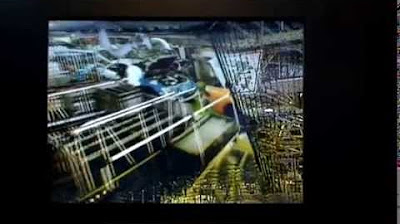Toyota Material Handling | The Toyota Production System (TPS)
Summary
TLDRThe Toyota Production System (TPS) focuses on building only what is ordered, ensuring efficiency and stable pricing for customers. It uses a 'just-in-time' principle, delivering parts exactly when and where they're needed. Workers are empowered as quality inspectors, with checks at each step of the assembly process to maintain high product quality. Regular meetings and leadership presence drive continuous improvement. Faulty parts are analyzed, and countermeasures are implemented to prevent future issues. TPS results in reduced waste, shorter lead times, cost savings, and top-tier quality for Toyota forklift customers.
Takeaways
- 🏭 Toyota Production System (TPS) is widely studied and implemented in manufacturing plants to optimize efficiency and quality.
- 📦 Toyota only produces what is ordered, keeping overhead costs low and ensuring stable pricing for customers.
- 📅 Equipment orders are scheduled based on production forecasts and slot availability to maintain a smooth workflow, a process called 'Hunka.'
- 🚚 Suppliers are also held to the Hunka process, ensuring a balanced material flow and just-in-time component delivery.
- 🔄 Toyota forklifts, tow tractors, and AGVs deliver parts directly to the assembly line, following the daily production schedule.
- 🛠 Associates focus on standardization and specialization, enabling them to work on different lines and produce multiple products.
- 🔍 Quality control is embedded in every step of production, with each associate acting as a quality inspector for their work.
- 📊 Regular shop floor meetings and management presence ensure continuous improvement in quality and safety.
- ✍️ Associates mark components with colored markers to indicate quality checks have been performed throughout the assembly process.
- 📝 Every product undergoes a final inspection, with 100% of Toyota products tested and inspected before reaching the customer.
Q & A
What is the Toyota Production System (TPS)?
-The Toyota Production System is a manufacturing methodology focused on reducing waste, increasing efficiency, and maintaining high quality. It is widely studied and applied in various industries worldwide.
How does the Toyota Production System benefit customers?
-Customers benefit from the Toyota Production System through stable pricing, shorter lead times, and high-quality products due to efficient, waste-reducing manufacturing processes.
What does it mean when Toyota builds 'only what is ordered'?
-This means that Toyota only produces items based on specific customer orders, helping to keep overhead costs low and providing predictable pricing for customers.
What is 'hunka' in the Toyota Production System?
-Hunka refers to Toyota's process of scheduling orders based on production forecasts and slot availability, ensuring a steady, level workflow throughout the factory.
How does Toyota ensure 'just-in-time' delivery on the assembly line?
-Toyota uses forklifts, tow tractors, and automated guided vehicles (AGVs) to deliver parts to the assembly line exactly when they are needed, based on the daily production schedule.
What is the purpose of the 'just-in-time' principle?
-The 'just-in-time' principle ensures that the right parts are delivered to the correct location on the assembly line at the exact time needed, improving efficiency and reducing waste.
How is quality maintained at each step of the Toyota Production System?
-Each associate acts as a quality inspector, checking components before they move to the next stage. They mark inspected parts with colored markers, indicating they’ve passed through quality checks.
What happens if a Toyota forklift has a defect or issue after it’s sold?
-The local Toyota dealer addresses the issue promptly with the customer, files a warranty claim with the factory, and the faulty part is inspected to prevent future defects.
How does the Toyota Production System contribute to reducing waste?
-TPS minimizes waste by eliminating unnecessary components and pollution, ensuring efficient material flow, and continuously improving processes to prevent defects and errors.
What does Toyota do to improve its processes based on warranty claims?
-Toyota analyzes returned parts with confirmed defects, develops countermeasures to prevent recurrence, and incorporates these solutions into their processes as new standards.
Outlines

This section is available to paid users only. Please upgrade to access this part.
Upgrade NowMindmap

This section is available to paid users only. Please upgrade to access this part.
Upgrade NowKeywords

This section is available to paid users only. Please upgrade to access this part.
Upgrade NowHighlights

This section is available to paid users only. Please upgrade to access this part.
Upgrade NowTranscripts

This section is available to paid users only. Please upgrade to access this part.
Upgrade Now5.0 / 5 (0 votes)





